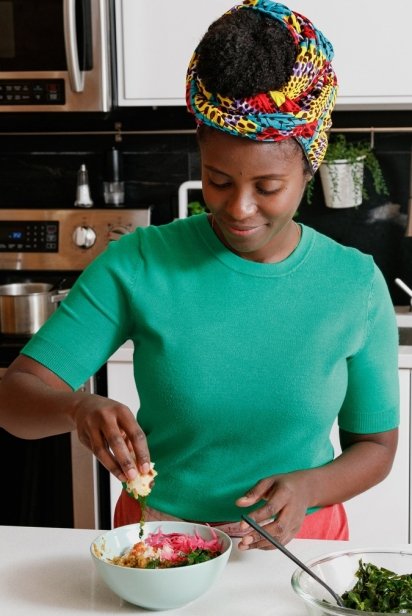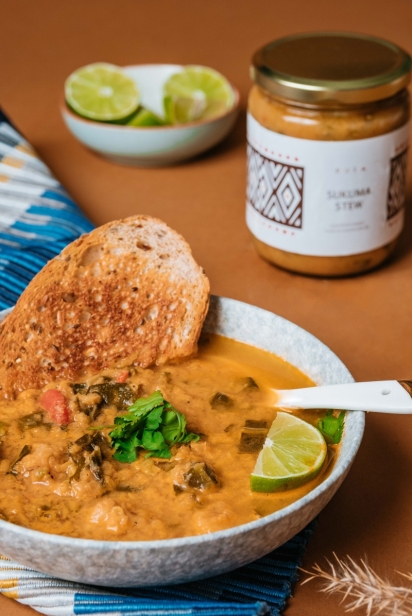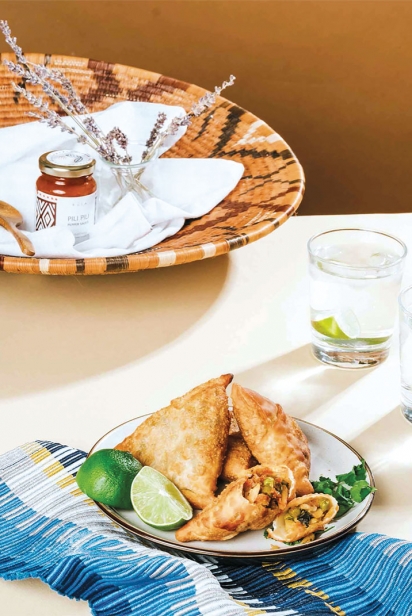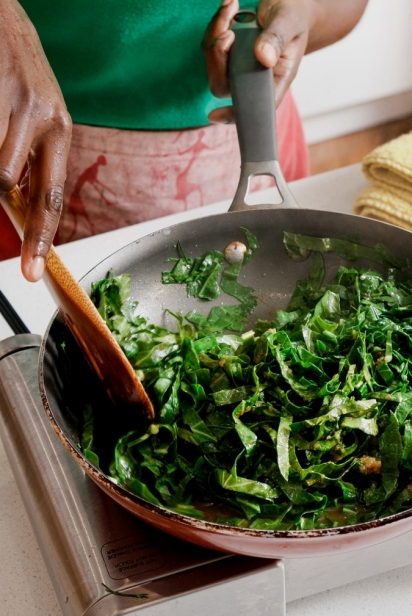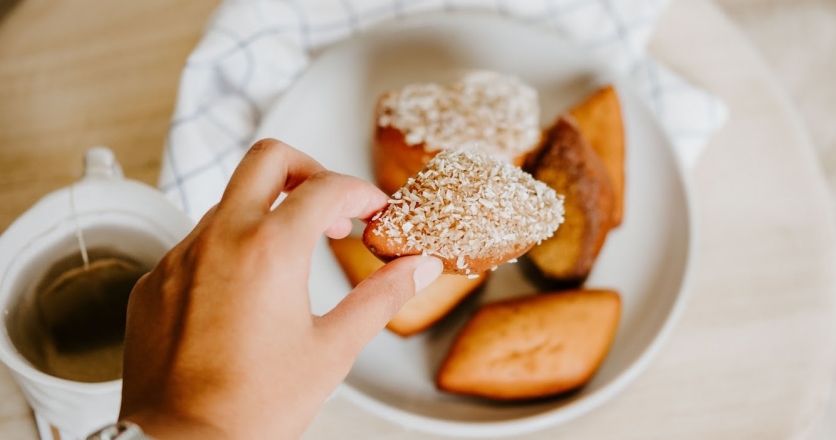Flavours of Kenya
When Asha Wheeldon came to Vancouver from Toronto five years ago for work, she noticed a unique opportunity to create more Afrocentric food options in her new city. “There was food from every region in Toronto, but not as much diversity in Vancouver,” she explains. Then, when Wheeldon was on maternity leave, she learned about upcoming layoffs at the large telecom where she worked in product and service development. She decided to take that as her chance to strike out on her own and start her own business: Kula Foods. “It was an opportunity to create a brand that aligns with my values and passion.”
New and familiar
“Kula” means “eat” in Swahili, and as Wheeldon describes it, it comes back to family and community. “I was born in Uganda, lived in Kenya and moved to Toronto when I was 11 years old. I aim to cook foods that I grew up enjoying, that my mother made, from East Africa — specifically, Kenya. It’s Afrocentric cooking in a plant-based way, with the added flair of what’s available to me here.”
For those who haven’t had the pleasure of trying Kenyan food, Wheeldon describes it as “at once new and familiar.” Food tells the story of the history that has shaped it. For Kenyan food, that means many diverse influences, including Indian and Portuguese. Another feature of Kenyan cuisine is its emphasis on whole, unprocessed foods, with lots of leafy vegetables such as collard greens.
“People who tell me they’ve never had Kenyan food often say it reminds them of Indian food. The truth is that there’s a lot of diversity even in Kenyan cooking and a lot of fusion. I even grew up eating lasagna. And now I make an Afrocentric plant- based lasagna,” she laughs. “It’s a process of education. I love having these interesting conversations around food. What means the most to me is the communal process of growing and cooking together. Food is community.”
An environmental lens
However, unlike traditional Kenyan cooking, Wheeldon’s food is vegan. “Vancouver has a great plant-based community,” Wheeldon exclaims. She explains that she made the transition to a plant-based lifestyle three years ago, for ethical and environmental reasons. “I wanted to make more of an environmental impact on a daily basis, so food was a no- brainer,” she explains. “My husband’s family is plant-based and now we’re raising our children plant-based as well. It’s wonderful to have the support of a community or family when becoming vegan. Plus, connecting with the ‘why’ makes it easier.”
“It’s not the only way we consider the environment,” Wheeldon adds. “For our packaging, we try to do as many reusables as possible. For the rest, we choose compostable or recyclable.”
Wheeldon also aims to support local suppliers and local growers as much as she can. (With the exception, of course, of the essential African spices.)
The flavours of Kenya
And when it comes to spice, Wheeldon explains that there is no skimping. Kula Foods’ signature Pili Pili Sauce is a chili pepper sauce that pairs with everything. “Some people say Peri Peri or Piri Piri, but we say Pili Pili. It’s a household signature. I started playing around with ingredients and making my own.” She sells it on her website and it pairs well with all of her dishes.
Another of Wheeldon’s favourites is her sukuma stew. “It’s our signature dish and the first dish that we created,” she says. “It’s a lentil stew with collard greens as the star. We add lots of spices, potatoes and spinach, so it’s nourishing and filling. We eat it with ugali [a type of maize flour porridge.]” Collard greens, Wheeldon explains, is “a poor man’s veggie. I use it to pay homage to where I came from as it was added to dishes to help make our meals go farther — make them last the week. We used what we had. It’s an homage to survival and hard work.”
Adapting to COVID
Survival and hard work continue to this day. Now, in the time of COVID-19, owning a food business poses unique challenges, especially as Kula Foods catered many events. “Catering is no longer feasible,” Wheeldon explains. She, like many food-business owners, pivoted and is now offering online ordering, curbside pickup and delivery for those in Vancouver and some surrounding areas. Customers can order nourishing and affordable family-style meals: packaged favourites as well as meal options that rotate on a weekly basis. Kula Foods’ wares are also available at several Vancouver locations, such as The Soap Dispensary, Blue Heron Creamery and Vegan Supply.
Black Lives Matter
In light of the Black Lives Matter movement, Kula Foods and other Black-owned Vancouver-based businesses have recently come into the spotlight. “It’s well deserved,” Wheeldon says. “We started our businesses to fill a gap that was missing. We did this — we brought our identities to our businesses.”Wheeldon is hopeful that the momentum will continue. “We want to see a shift, with long-term changes. We need to have important conversations about how we see differences. I have children and I want them to grow up included. When we say things like ‘I don’t see colour,’ it doesn’t work. There are people who are left behind. And there is so much richness and diversity to learn about. Food is just one example. Canadian culture is often to be quiet and stay silent and polite, but it’s time to break free of that.”
Wheeldon offers suggestions for non-Black folks learning to be anti-racist. “This is just the beginning. It’s time to revisit our history and maybe learn something new. If you have hurt feelings or feel guilt, dive into it and work your way through it. Let’s start, let’s reassess and learn. Honestly, it’s really painful to see what is happening. I hope good things come out of it.”
Kula Foods
kulakitchen.ca | 604-655-5044 | @kulakitchen
Black-owned Vancouver-based food businesses
From the BeetBox Veg's vegan comfort food and Elbo's Jamaican patties to Mumgry's chocolate peanut butter spread, here are just a few of the Black-owned restaurants and food businesses to discover.
Restaurants
BeetBox Veg
Harambe
PG’s Jamaican Restaurant
The Lion’s Den
Simba’s Grill
The Loft Lounge
Taps & Tacos
Food companies
Rich Sol Foods
Juicekadi
Mumgry
Food on the Table
Marie’s Guilt-Free Bakery
Elbo Patties
Farafena
Lagoschop
Berhan Grains
Raphael’s Gourmet



